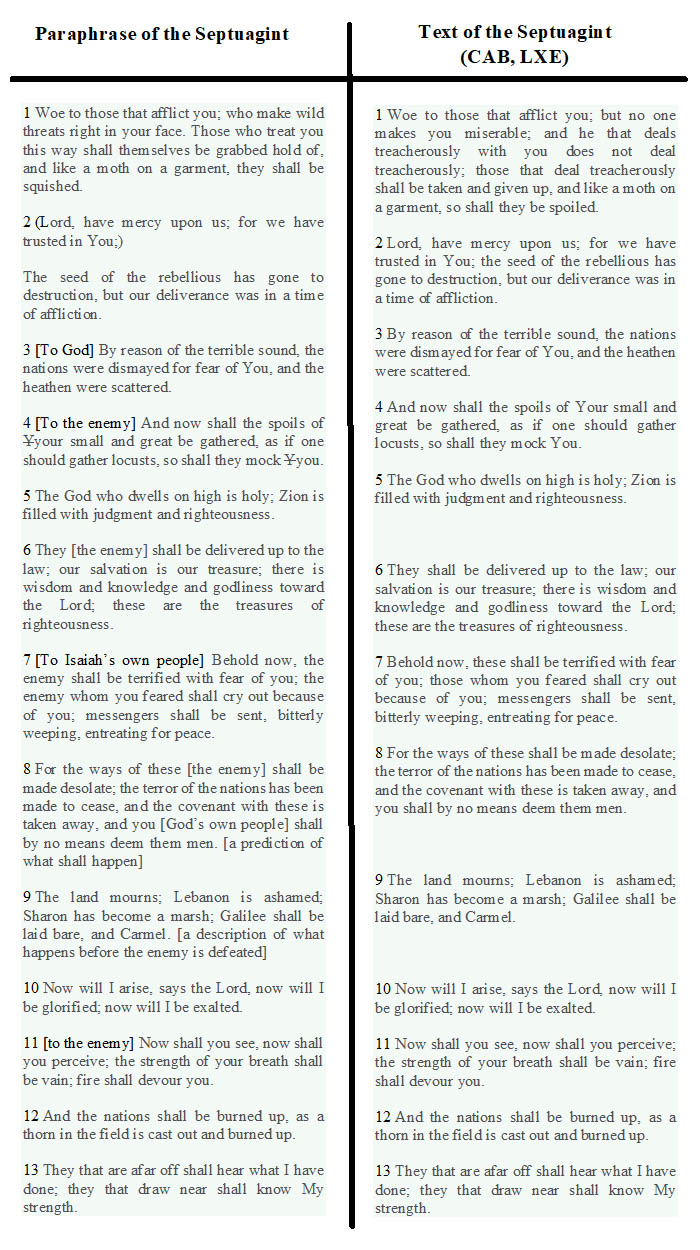Isaiah 33 Septuagint Modernized NETS
Overview
The majority of commentators assign the curse of “Woe…!” in verse 1 upon the Assyrians, led by Sennacherib. Assyria attacked Judah and Jerusalem in Isaiah’s lifetime. God turned them back before they completed the siege against Jerusalem (2 Kings 18:13-19:37). The other major enemy was Babylon. Led by Nebuchadnezzar, the Babylonians successfully overwhelmed Jerusalem approximately one hundred years later. Assigning this passage to the events surrounding Assyria’s unsuccessful siege of Jerusalem makes the most sense.
Verse two switches immediately to a prayer for mercy, made in the prophet’s own voice on behalf of the people. The prayer is very short–only two clauses. The concluding sentence of verse two, “The seed of the rebellious has gone to destruction, but our deliverance was in a time of affliction,” is a summary of historical events surrounding the siege of Jerusalem by Assyrian forces.
God replies affirmatively to the prayer in verses 10-13. The remainder of the chapter, through verse 24, speaks of a King and blessings for Zion. Once again readers will find a sharp contrast between final outcomes for those who oppose God and for those who trustfully turn to him for their safety.
Interpretation of Septuagint Verse 1
Verse 1 in the Septuagint at first, second, and even third glances appears nearly obscure in its language.
Woe to those that afflict you; but no one makes you miserable; and he that deals treacherously with you does not deal treacherously; those that deal treacherously shall be taken and given up, and like a moth on a garment, so shall they be spoiled. Isaiah 33:1 CAB, LXE
History reveals that God miraculously intervened on behalf of Jerusalem. He turned Sennacherib back at its walls (See the account at 2 Kings 18:13-19:37). For all Sennacherib’s loud bluster and threats, nothing came of them. The dramatic interchanges between Sennacherib and King Hezekiah will appear in Isaiah chapters 36 and 37. But for now, consider this verse from the New Testament.
Be sober-minded; be watchful. Your adversary the devil prowls around like a roaring lion, seeking someone to devour. (1Peter 5:8 ESV)
One of the lessons all Christians learn through experience is that the roaring of the devil Satan is not the same as being torn to pieces by him. When Sennacherib appeared at Jerusalem’s city walls, he roared and threatened, but did not immediately attack. King Hezekiah turned to the Lord and to the Lord’s prophet Isaiah. God replied by miraculously defeating the foe. Threats are not the same as actions. When Christians cave to the enemy in the face of threats, it is they themselves causing their own misery, not the enemy. Christians must learn to trust the Lord, just like King Hezekiah. Although he was afraid, he did not give ground. Let the enemy roar in their faces, God will protect his own at break of day.
A Play Unfolds
Assuming that the enemy in this particular chapter is Assyria, then how shall we parse these verses?
THE CHARACTERS
First, there are five characters: 1) The prophet and his people, 2) God, 3) the enemy Assyria, 4) the outlying regions of Judah, and 5) unnamed plunderers.
SYNOPSIS OF THE ACTION
Second, Isaiah fairly jumps back and forth among these characters, as though recording a play. Using a different analogy, he puts into a static painting action which occurs over a span of time. But, Isaiah jumbles the chronology. According to 2 Kings 18:13-19:37, Assyria attacked and overcame the outlying regions of Judah. These are Lebanon, Sharon, Galilee and Carmel (verse 9). Assyria’s general, Sennacherib, stopped at the walls of Jerusalem and taunted King Hezekiah and his soldiers there. Hezekiah prayed to the Lord. Isaiah prophesied exactly what would happen. Then the Lord killed the Assyrians overnight in a miraculous delivery for Judah. Sennacherib returned to his home. And the people of Jerusalem went out and gathered a great spoil from the camp.

Note: Because the original Greek text contains no capitalization, it is fair to remove capitals from the Brenton translation in verse 4. (All translations interpret the original.) These capitals (verse 4) indicate the speaker addresses God. But this does not make sense in the context of verses surrounding verse 4. Therefore, without changing any words at all, using lower case “y” clarifies the meaning of the text. By removing the capitals, the object changes. The plunderers gather from the fallen enemy, making fun of this enemy as they do so. This narrative corresponds to the history given in 2 Kings. In support of this interpretive change, the NETS translation, by Moises Silva, uses no capitals in verse 4.
VERSE 14A
14a The sinners in Zion have departed; 14b trembling shall seize the ungodly. Who will tell you that a fire is kindled? Who will tell you of the eternal place?
The first clause of verse 14 belongs with the prior section. It concludes the previous action with a historical summary. Sennacherib and what few remained of his army left. Verse 14b should begin a new paragraph. It seems to belong best with the next section, a description of Messiah and his kingdom. Messiah, of course, arrives on the scene far into Isaiah’s future. Isaiah, however, always returns to him, inserting mention of him more and more frequently as the book progresses.
Chapter 33 to be continued…
